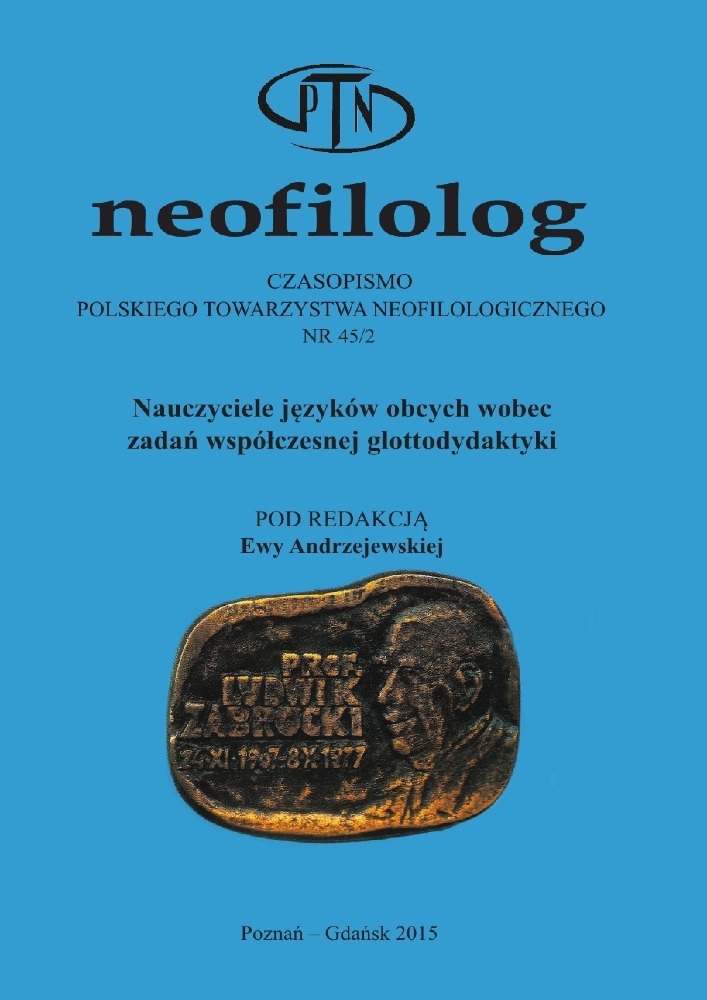Abstract
Media literacy is one of the basic elements of a foreign languageteacher’s workshop. Foreign language teaching recommends using media
in the classroom not only because it facilitates learning and teaching,
but also because it fosters learner autonomy, stimulates creativity
and lowers the affective filter. Taking this into account, the authors consider
how to develop the media competence of future teachers of English
and German as foreign languages from both theoretical and practical
perspectives. In the empirical part of the paper the authors present
the aims, participants, stages and results of an e-tandem project that
targeted a group of Polish and German students.
References
Adamczak-Krysztofowicz, S., Stolarczyk, B. 2014. „Virtueller Spaziergang durch meinen und deinen Studienort. Ausgewählte Ergebnisse eines deutsch-polnischen E-Tandemprojekts zwischen der Technischen Universität Darmstadt und der Adam-Mickiewicz Universität Poznań” (w) Info DaF 6: 668-684.
Adamczak-Krysztofowicz, S., Stork, A. 2013. „Unterrichtsmaterialien via elektronische Medien grenzüberschreitend entwickeln. Ausgewählte Ergebnisse eines Koopera-tionsprojekts zwischen Studierenden aus Poznań und Marburg“ (w) Fremdspra-chenunterricht – omnimedial? (red. S. Chudak). Frankfurt a.M.: Lang: 147-159.
Beatty, K. 2010. Teaching and researching computer-assisted language learning. Har-low: Pearson.
Bloom, B., Engelhart, M. D., Furst, E. J., Hill, W. H., Krathwohl, D. R. 1956. Taxonomy of educational objectives. Handbook I: Cognitive domain. New York: McKay.
Coste, D., North, B., Sheils, J., Trim, J. 2003. Europejski system opisu kształcenia językowego: uczenie się, nauczanie, ocenianie. Warszawa: Wydawnictwa Centralne-go Ośrodka Doskonalenia Nauczycieli.
Crowl, T. K., Kaminsky, S., Podell, D. M. 1997. Educational psychology: Windows on teaching. Madison, WI: Brown and Benchmark.
Gajek, E. 2012. „Komunikacja językowa i międzykulturowa uczniów w projektach eTwinning”. Języki Obce w Szkole 3: 37-41.
Glaser, E. M. 1941. An experiment in the development of critical thinking. New York: AMS.
Górecka, J. 2009. „Specyfika i potencjał mediów elektronicznych a rozwijanie kompetencji komunikacyjnej na poziomie zaawansowanym. Jak definiować cele edukacji medialnej w kontekście studiów neofilologicznych” (w) Komunikowanie (się) w mediach elektronicznych. Język, edukacja, semiotyka (red. M. Filipiak i G. Ptaszek). Warszawa: Wydawnictwa Akademickie i Profesjonalne: 223-239.
Grucza, F. 1997. „Języki ludzkie a wyrażenia językowe, wiedza a informacja, mózg a umysł ludzki” (w) Podejście kognitywne w lingwistyce, translatoryce i glottodydaktyce (red. M. Dakowska i F. Grucza). Warszawa: Wydawnictwo UW.
Hutchings, G. A., Hall, W. 1992. „Authoring and evaluation of hypermedia for education”. Computers Education 18 (1-3): 171-177.
Komorowska, H. 2001. Metodyka nauczania języków obcych. Warszawa: Fraszka Edukacyjna.
Krajowe Ramy Kwalifikacji dla Szkolnictwa Wyższego. 2011. Dziennik Ustaw nr 253, pozycja 1520 polsl.pl/Informacje/ProcesBolonski/Documents/Dokumenty_MNiSW/ DzUNr253poz1520.pdf DW 14.07.2014.
Lewicka, G. 2007. Glottodydaktyczne aspekty akwizycji języka drugiego a konstruktywistyczna teoria uczenia się. Wrocław: Oficyna Wydawnicza ATUT.
Newby, D., Allan, R., Fenner, A-B., Jones, B., Komorowska, H., Soghikyan, K. 2007. Europejskie portfolio dla studentów – przyszłych nauczycieli języków. Narzędzie re-fleksji w kształceniu nauczycieli języków obcych (EPS).Tłumaczenie z języka an-gielskiego M. Pawlak. Warszawa: Centralny Ośrodek Doskonalenia Nauczycieli.
Pawlak, M., Wolski, B. (red.) 2011. Wykorzystanie nowoczesnych technologii w dydaktyce języków obcych. Poznań-Kalisz-Konin: Wydawnictwo PWSZ w Koninie i UAM w Poznaniu.
Peryt-Poręba, A. (2011). „Akademicka pedeutologia informatyczno-medialna przyszłych nauczycieli polonistów”. www.ktime.up.krakow.pl/symp2011/referaty2011/peryt.pdf DW 14.05.2015.
Pfeiffer, W. 2001. Nauka języków obcych. Od praktyki do praktyki. Poznań: WAGROS.
Schooler, J. W ., Fallshore, M., Fiore, S. M. 1995. „Epilogue: Putting insight into perspective” (w) The nature of insight (red. R. J. Sternberg i J. E. Davidson). Cambridge, MA: The MIT Press: 559-588.
Wilczyńska, W. 2001. „Autonomizacja jako przedmiot badań glottodydaktycznych”. Neofilolog 19: 6-12.
Wilczyńska, W. 2002. „ZT 3: Podmiotowość i autonomia jako wyznaczniki osobistej kompetencji komunikacyjnej” (w) Autonomizacja w dydaktyce języków obcych. Doskonalenie się w komunikacji ustnej (red. W. Wilczyńska). Poznań: Wydawnictwo Naukowe UAM: 51-68.
License
Copyright (c) 2019 Neofilolog

This work is licensed under a Creative Commons Attribution-NoDerivatives 4.0 International License.
Authors
Authors of texts accepted for publication in Neofilolog are required to complete, sign and return to the Editorial team’s office the Agreement for granting a royalty-free license to works with a commitment to grant a CC sub-license.
Under the agreement, the authors of the texts published in Neofilolog grant Adam Mickiewicz University in Poznań a non-exclusive, royalty-free license and authorize the use of Attribution-NoDerivatives 4.0 International (CC BY-ND 4.0) Creative Commons sub-license.
The authors retain the right to the free disposal of the work.
Users
Interested Internet users are entitled to use works that have been published in Neofilolog since 2017, under the following conditions:
▪ attribution – obligation to provide, together with the distributed work, information about the authorship, title, source (link to the original work, DOI) and the license itself.
▪ no derivatives – the work must be preserved in its original form. Without the author's consent, it is not possible to distribute the modified work in the form of translations, publications, etc.
Copyrights are reserved for all texts published since 2017.
Miscellaneous
Adam Mickiewicz University in Poznań retains the property right as a whole (layout, graphic form, title, cover design, logo etc.).
